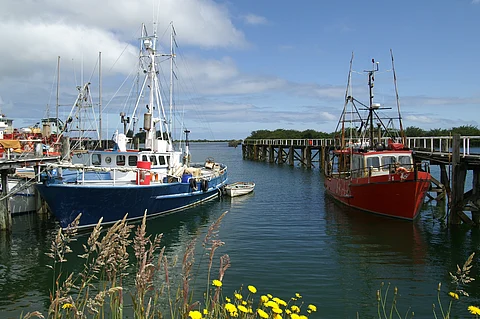

Oceans and Fisheries Minister Shane Jones said these changes are the most significant reforms to the Fisheries Act in New Zealand for decades.
Photo: Ralf Broskvar / Adobe Stock
In February, the Government of New Zealand announced that it was opening its proposed major fisheries reforms to public consultation. Now, after analyzing the nearly 27,000 opinions received between February 12 and April 11 and reflecting them in officials' advice to Oceans and Fisheries Minister Shane Jones on final policy decisions, Cabinet considered a range of measures and agreed to amend the Fisheries Act 1996 to move forward with the reform.
"These changes are the most significant reforms to the Fisheries Act for decades and they reflect my commitment to the success of our fishing industry, which generates around AUD 1.5 billion in exports each year," Minister Jones said, adding that the law change will remove obstacles for the fishing industry to achieve its enormous potential for sustainable growth.
The statement from the NZ Oceans and Fisheries Ministry pointed out that one of the key features of the reforms is more efficient and effective decision-making in setting sustainable catch limits. The modifications mean specific fisheries will be able to have rules that automatically respond to changes in abundance for up to five years, thereby improving the responsiveness and flexibility of the fisheries management system.
"These rules will be subject to the usual scientific evaluation and consultation processes but will allow for greater catch when there are more fish in the water and more responsive intervention when fisheries need to recover," Shane Jones explained. "This replaces the much slower process currently in place where each change must be assessed and be considered separately," he added.
Another change highlighted by the Oceans and Fisheries Ministry is that fishermen's privacy will be better protected through a change that will exclude recordings from the Official Information Act. "We are making changes to the onboard camera programme to protect the privacy and confidentiality of regular New Zealanders going about their legal business," the Minister said.
"The information from on-board cameras will continue to contribute to fisheries management but camera footage will not be subject to the Official Information Act 1982. Fishers won't need to worry about private or commercially sensitive footage being publicly released and either deliberately or unintentionally misconstrued," Jones stated.
Finally, among the reforms now amended by the New Zealand Government are those that establish practical and workable rules on when fish must be landed and when they can be returned to the sea in vessels monitored by onboard cameras or observers.
"As long as the catch is monitored and accounted for under the Fisheries Act, fishers will be able to decide whether to land or discard relevant catch," the Oceans and Fisheries Minister summarized.
In conclusion, Shane Jones claimed that, taken together, these changes support the Government's objective of removing unnecessary barriers to growth. "I want a thriving and sustainable fishing industry that continues to contribute to New Zealand's export-led recovery," he closed.
With these amendments included - more information is available on the New Zealand Ministry for Primary Industries website -, the amendment bill to the Fisheries Act 1996 will be tabled later this year, and, again, people and interested parties will have the opportunity to provide feedback during the select committee process.
